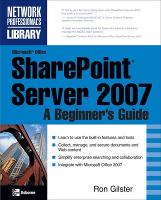


|
|
| book details |
Microsoft(r) Office Sharepoint(r) Server 2007: A Beginner's Guide
By (author) Ron Gilster

|
This book is currently unavailable. Enquire to check if we can source a used copy
|
| book description |
Set up and administer a SharePoint Server 2007 environment Get started on Microsoft Office SharePoint Server 2007 quickly and easily with help from this step-by-step guide. Using clear instructions, Microsoft Office SharePoint Server 2007: A Beginner's Guide shows you how to set up and configure SharePoint Server, collect and store data, build lists and libraries, and enable enterprise search capabilities. You'll learn how to create portals and Web pages, secure your SharePoint Server 2007 environment, and optimize performance. Microsoft Office 2007 integration techniques are also covered. Install and configure SharePoint Server 2007 Secure your SharePoint Server network and data Easily locate files and folders using the Search feature Simplify data collection using forms and workflows Logically organize content into lists and libraries Monitor, maintain, and back up your SharePoint Server environment Build Web applications and portals from reusable, modular Web Parts Improve efficiency using customized views and metadata schemes Seamlessly integrate with Microsoft Office Outlook 2007
| product details |
Normally shipped |
Publisher | McGraw-Hill Education - Europe
Published date | 2 Oct 2007
Language |
Format | Digital (delivered electronically)
Pages | 625
Dimensions | 0 x 0 x 0mm (L x W x H)
Weight | 0g
ISBN | 978-0-0715-9514-8
Readership Age |
BISAC | computers / client-server computing
| other options |
|
|
|
To view the items in your trolley please sign in.
| sign in |
|
|
|
| specials |
|
|

|
Mason Coile
Paperback / softback
224 pages
was: R 520.95
now: R 468.95
|
A terrifying locked-room mystery set in a remote outpost on Mars.
|
An epic love story with the pulse of a thriller that asks: what would you risk for a second chance at first love?
|
|
|
|
|